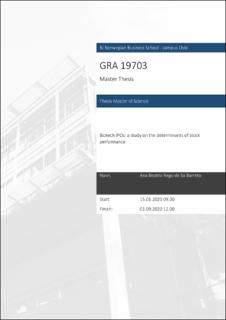Biotech IPOs: a study on the determinants of stock performance
Master thesis
Permanent lenke
https://hdl.handle.net/11250/2686601Utgivelsesdato
2020Metadata
Vis full innførselSamlinger
- Master of Science [1621]
Sammendrag
This thesis investigates the short-run and long-run performance of 459 Biotech
IPOs issued between 1991 and 2016 in the United States, by analyzing determinants
such as the underwriter's prestige, the syndicate involved, the amount of dollars
raised by the company, the financial sponsors supporting the transaction and the
IPO market cycle. The findings revealed that the Biotech sample suffered from less
underpricing than the overall IPO market, with an average first-day return of 7.5%
against 14.9% for the Aggregate sample. The presence of a private equity firm and
a larger syndicate with unique underwriters seemed to help reducing the
underpricing level, while the amount of proceeds exhibited a positive correlation
with the first-day return. In the long-run perspective, the findings depended on
which metric was applied. The buy-and-hold returns (BAHR) indicated that Biotech
IPOs experience negative abnormal returns during the analyzed period, while the
cumulative abnormal return (CAR) suggested that these stocks had positive
abnormal returns. The results show that Biotech IPOs backed by venture capital or
private equity firms have higher long-run performance when analyzing the BAHR
metric, and Biotech IPOs held in high activity periods and supported by large
syndicates and prestigious underwriters perform better when analyzing the CAR
metric.
Keywords: Biotech, IPOs, underpricing, short-run performance, long-run
performance, abnormal-returns
Beskrivelse
Masteroppgave(MSc) in Master of Science in Finance - Handelshøyskolen BI, 2020
